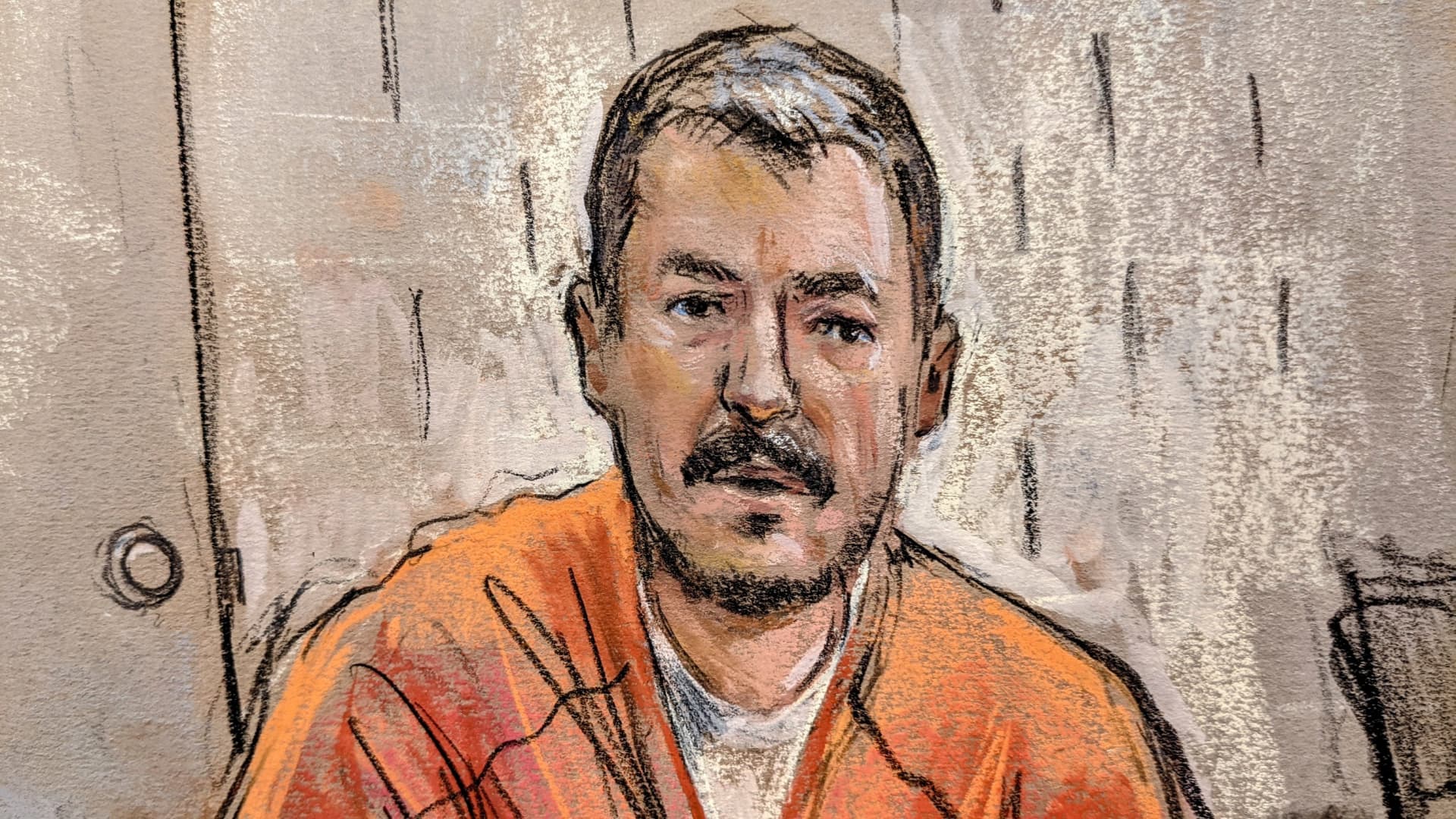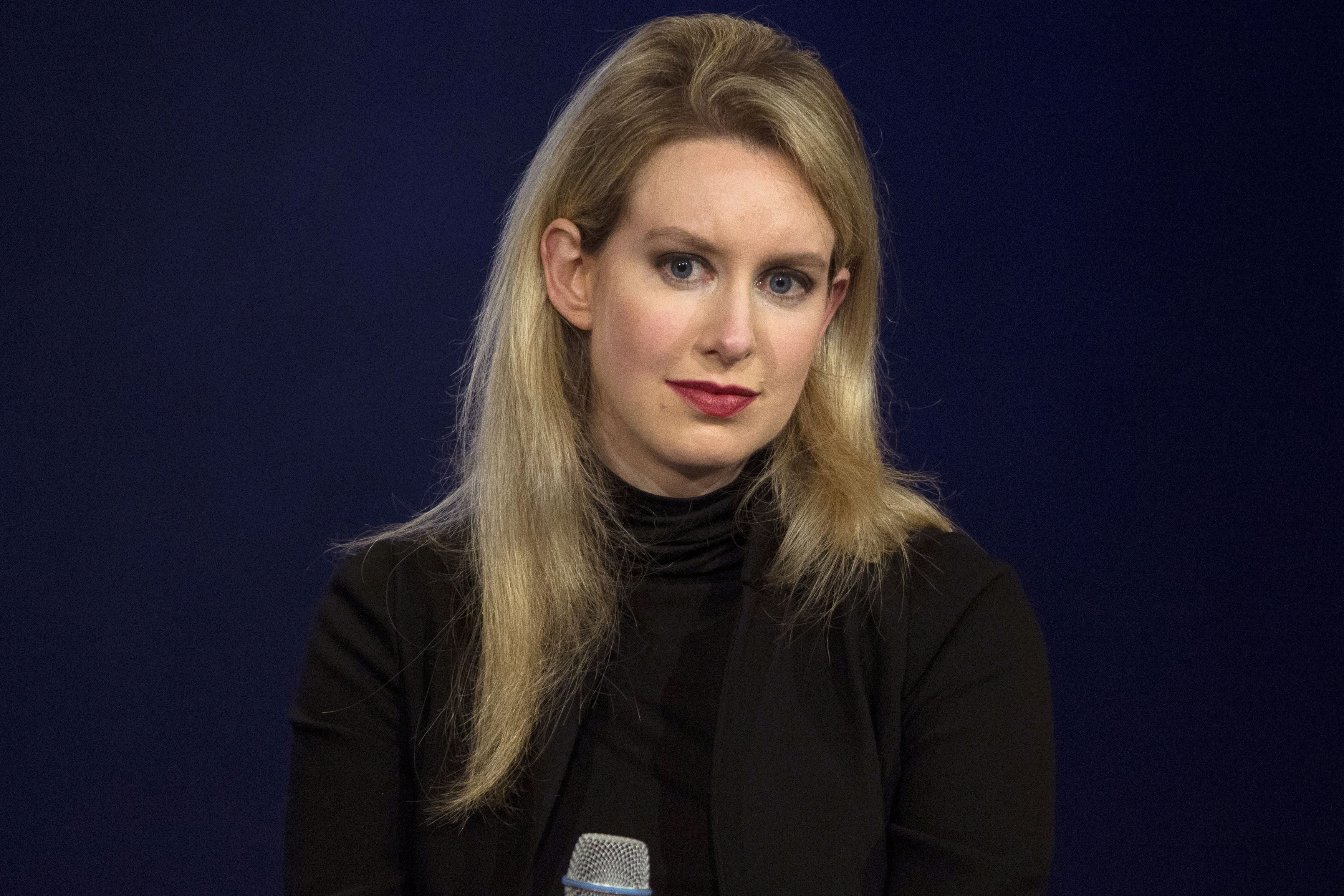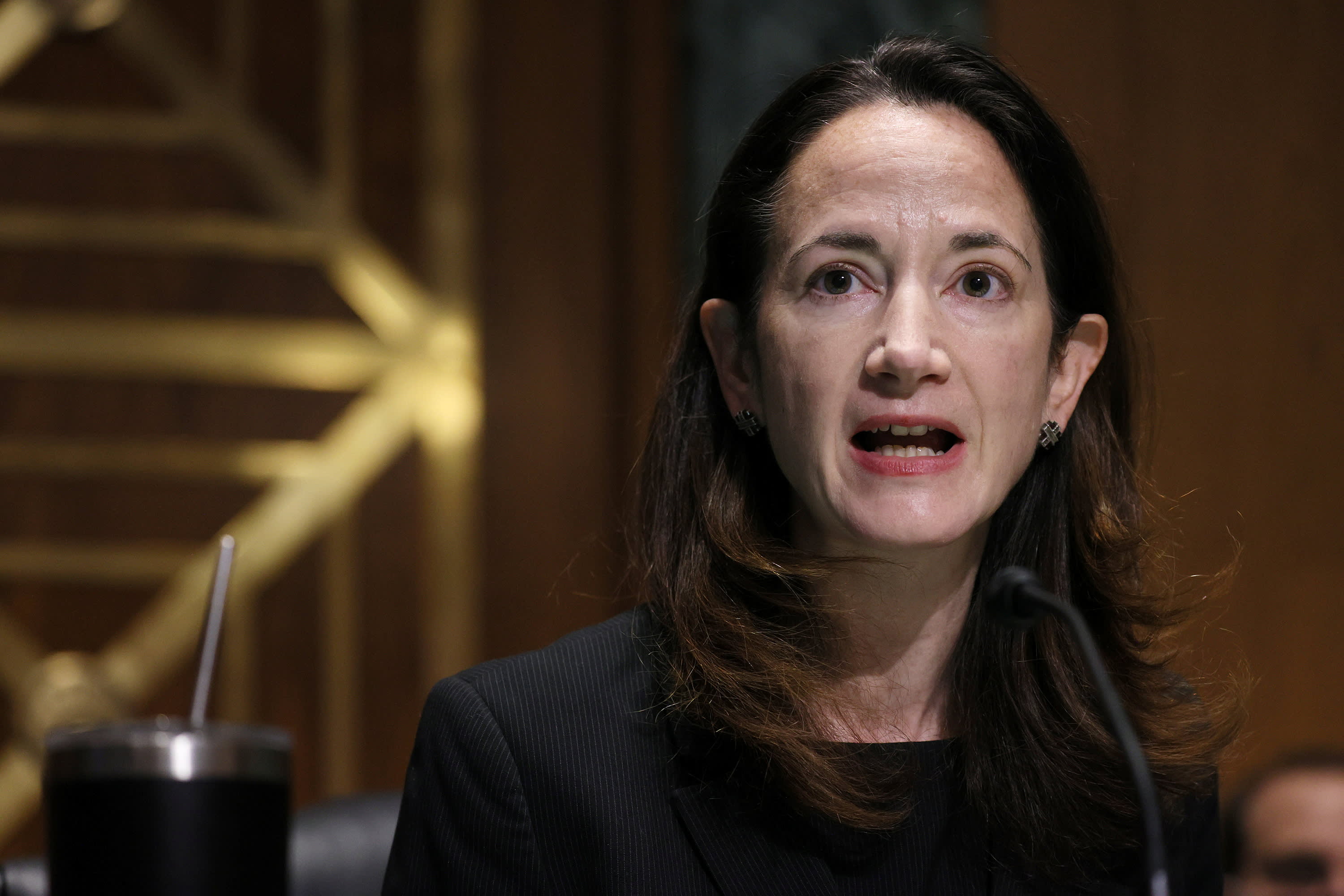Jan. 6 committee sends DOJ historic criminal referral of Trump over Capitol riot
The Jan. 6 committee's crminal referral of Donald Trump comes as he seeks the 2024 GOP nomination for president, and as he faces two DOJ criminal probes.
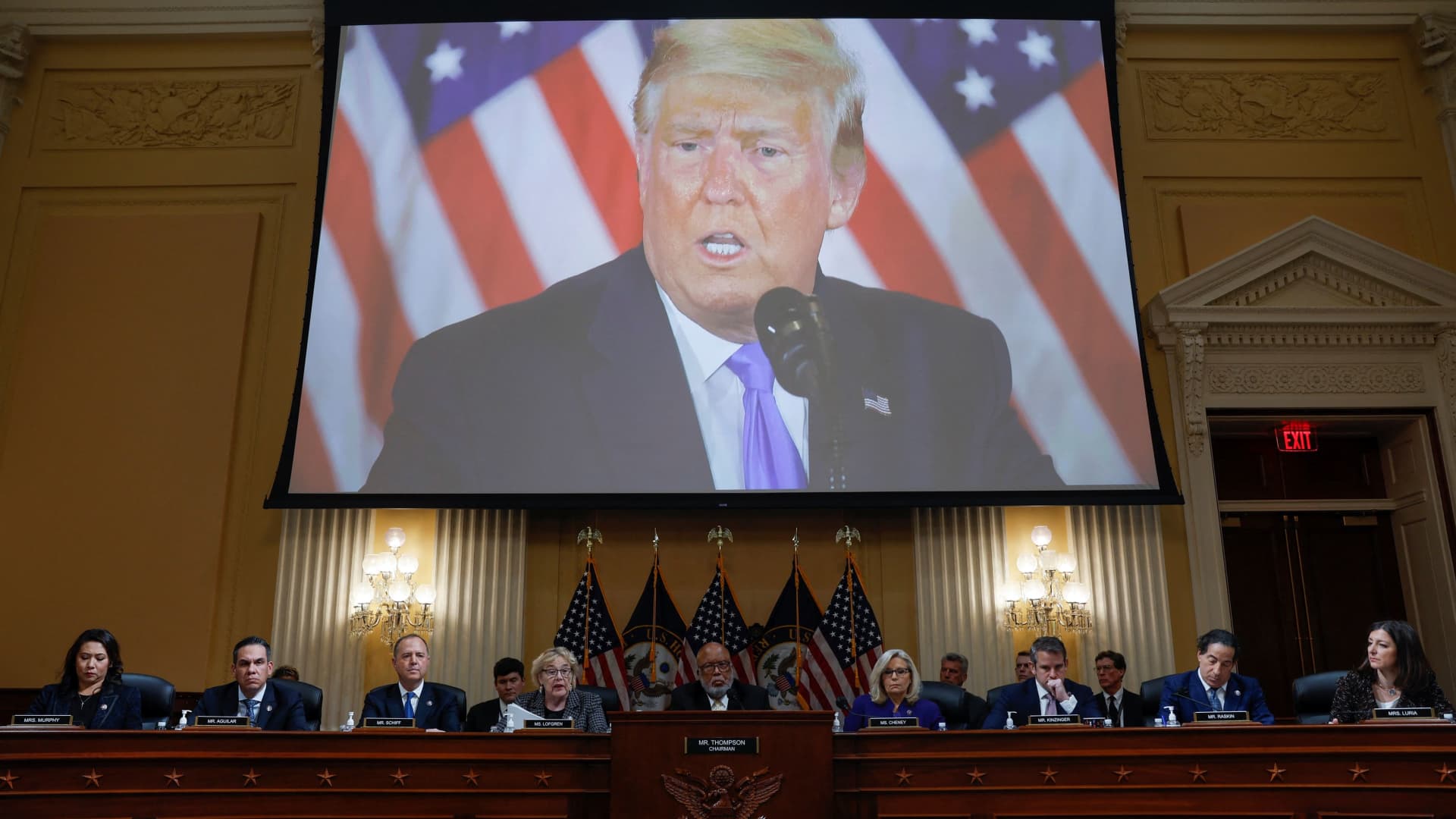
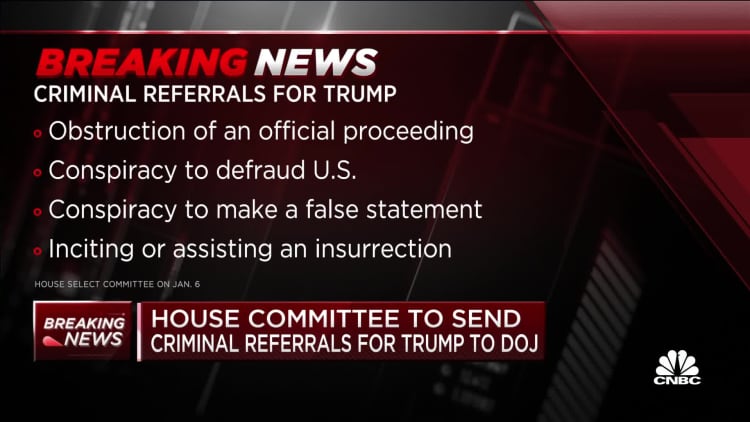
The Jan. 6 select House committee in a unanimous vote Monday referred former President Donald Trump to the Department of Justice for criminal investigation and potential prosecution for his efforts to overturn his loss in the 2020 election.
The committee's historic referral says there is sufficient evidence to refer Trump for four crimes: obstructing an official proceeding, conspiracy to defraud the government, making knowingly and willfully materially false statements to the federal government, and inciting or assisting an insurrection.
"We propose to the committee advancing referrals where the gravity of the specific offense, the severity of its actual harm, and the centrality of the offender to the overall design of the unlawful scheme to overthrow the election, compel us to speak," said Rep. Jamie Raskin, D-Md., as he addressed his fellow panel members.
"Ours is not a system of justice where foot soldiers go to jail and the masterminds and ringleaders get a free pass," Raskin said.
While the Justice Department, which is already conducting an investigation of Trump, takes criminal referrals seriously, it is not obligated to charge anyone with a crime.
However, the House panel's referral underscores how seriously the committee views Trump's actions after the election, in the weeks leading up to the Jan. 6, 2021, invasion of the halls of Congress by a mob of his supporters.
The nine-member panel is composed of seven Democrats and two Republicans, Reps. Liz Cheney of Wyoming and Adam Kinzinger of Illinois. Cheney was defeated in the GOP primary earlier this year, losing to Rep.-elect Harriet Hageman, while Kinzinger did not seek reelection this year.
Trump, who has denied any wrongdoing, has not been charged with any crimes related to the 2020 election and the attack on the U.S. Capitol.
Five people died as an immediate result of the riot, one of them a Capitol Police officer, Brian Sicknick. Nearly 140 other Capitol and Washington, D.C., police officers were injured in the attack, and several cops took their own lives on the heels of the riot.
If Trump were to be charged with and convicted of insurrection, he theoretically could be barred from holding federal office again under the 14th Amendment of the U.S. Constitution. Trump last month announced that he will seek the Republican nomination for president in 2024.
The committee on Monday also recommended that the DOJ investigate and potentially prosecute Trump's election law attorney John Eastman for his role in advancing a plan to overturn the election results. Eastman's referral was for his alleged violation of two criminal statutes: impeding an official proceeding of the United States government, and conspiring to defraud the United States.
Eastman was the author of a two-page memo that outlined a plan for then-Vice President Mike Pence to refuse to certify several states' Electoral College electors when Congress met for that purpose on Jan. 6.
U.S. Rep. Jamie Raskin (D-MD) carries the comittee's final report as he departs after the final public meeting of the U.S. House Select Committee investigating the January 6 Attack on the U.S. Capitol, on Capitol Hill in Washington, U.S., December 19, 2022.
Jonathan Ernst | Reuters
Raskin said the committee would refer four members of Congress "for appropriate sanction by the House Ethics Committee for failure to comply with lawful subpoenas." He did not name them, but House Minority Leader Kevin McCarthy is among the members who defied a subpoena from the committee.
As it made its referrals, the committee released a 154-page executive summary of its investigation.
The committee's actions Monday come after nearly 18 months of investigation, which included more than 1,200 witness interviews, the examination of hundreds of thousands of documents, the issuance of more than 100 subpoenas, and public hearings.
The DOJ already is conducting a criminal probe of Trump for his actions after the election, which involved an effort to reverse his losses to President Joe Biden in several swing states and to pressure Pence to refuse to accept Congress' certification of Biden's victory in the Electoral College.
The members of the U.S. House Select Committee investigating the January 6 Attack on the U.S. Capitol sit beneath a video of former U.S. President Donald Trump talking about the results of the 2020 U.S. Presidential election as they hold their final public meeting to release their report on Capitol Hill in Washington, U.S., December 19, 2022.
Jonathan Ernst | Reuters
The DOJ also is separately investigating him for his removal of government documents from the White House when he left office in January 2021.
House Speaker Nancy Pelosi, D-Calif., in a statement Monday lauded the committee's work.
"With painstaking detail, this executive summary documents the sinister plot to subvert the Congress, shred the Constitution and halt the peaceful transfer of power," Pelosi said, adding that she respects the panel's findings.
"Our Founders made clear that, in the United States of America, no one is above the law," Pelosi said. "This bedrock principle remains unequivocally true, and justice must be done."
Jack Smith, who was appointed special counsel for the DOJ last month to handle its investigations of Trump, said at the time of that appointment, "I intend to conduct the assigned investigations, and any prosecutions that may result from them, independently and in the best traditions of the Department of Justice."
Smith added at that time: "The pace of the investigations will not pause or flag under my watch. I will exercise independent judgement and will move the investigations forward expeditiously and thoroughly to whatever outcome the facts and the law dictate."
Trump has called the investigations into his conduct after the 2020 election "witch hunts" and defended his actions as legitimate.
He continues to falsely claim he won the election and that Biden's victory was the result of widespread voter fraud in the swing states he lost.
Trump also has claimed that Pence had the authority to reject the Electoral College votes of those contested swing states. However, Pence concluded he did not have that power, a conclusion that is backed by a wide array of constitutional scholars and others.
A Trump spokesman over the weekend told NBC News in a statement, "The January 6th un-Select Committee held show trials by Never Trump partisans who are a stain on this country's history."
"This Kangaroo court has been nothing more than a vanity project that insults Americans' intelligence and makes a mockery of our democracy," the spokesman said.

 Tfoso
Tfoso 








